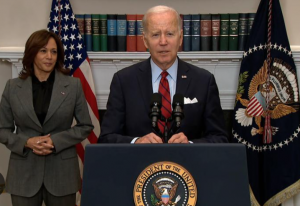 While the courts have prevented the Title 42 public health order from lifting for now, the Biden-Harris Administration today is announcing new enforcement measures to increase security at the border and reduce the number of individuals crossing unlawfully between ports of entry. These measures will expand and expedite legal pathways for orderly migration and result in new consequences for those who fail to use those legal pathways. They also draw on the success of the Venezuela initiative, which launched in October 2022 and has resulted in a dramatic drop in the number of Venezuelan nationals attempting to enter the United States unlawfully.
While the courts have prevented the Title 42 public health order from lifting for now, the Biden-Harris Administration today is announcing new enforcement measures to increase security at the border and reduce the number of individuals crossing unlawfully between ports of entry. These measures will expand and expedite legal pathways for orderly migration and result in new consequences for those who fail to use those legal pathways. They also draw on the success of the Venezuela initiative, which launched in October 2022 and has resulted in a dramatic drop in the number of Venezuelan nationals attempting to enter the United States unlawfully.
The Administration is also announcing that it is surging additional resources to the border and the region, scaling up its anti-smuggling operations, and expanding coordination and support for border cities and non-governmental organizations. Importantly, the actions announced today are being implemented in close partnership with Mexico and governments across the Western Hemisphere.
While these steps will help address some of the most acute challenges at the Southwest border, they will not solve all of the problems in an immigration system that has been broken for far too long. That can only happen if Republicans in Congress who have spent the past two years talking about border security quit blocking the comprehensive immigration reform and border security measures President Biden proposed on his first day in office, and opposing the billions of dollars in additional funds the President has requested for border security and management.
Unlike some Republican officials playing political games and obstructing real solutions to fix our broken immigration system, President Biden has a plan and is taking action. Under the new enforcement measures announced today, the Biden-Harris Administration will:
Impose New Consequences for Individuals who Attempt to Enter Unlawfully
To facilitate a return to the processing of all noncitizens under Title 8 authorities when Title 42 eventually lifts, the Department of Homeland Security (DHS) is:
- Increasing the Use of Expedited Removal. Effective immediately, individuals who attempt to enter the United States without permission, do not have a legal basis to remain, and cannot be expelled pursuant to Title 42 will be increasingly subject to expedited removal to their country of origin and subject to a five-year ban on reentry.
- Announcing New Measures to Encourage Individuals to Seek Orderly and Lawful Pathways to Migration. DHS and the Department of Justice today are announcing their intent to propose a new regulation that would encourage individuals to seek orderly and lawful pathways to migration and reduce overcrowding along the southwest border and the strain on the immigration system.
Expand Legal Pathways for Safe, Orderly, and Humane Migration
The Biden-Harris Administration and its international partners in the region are also announcing new and expanded legal pathways to the United States and other countries that individuals can and should use to avoid consequences for crossing the border unlawfully. These include:
- Expanding the Parole Process for Venezuelans to Nicaraguans, Haitians, and Cubans. Today, the Biden Administration is announcing it will extend the successful Venezuela parole process and expand it to nationals of Nicaragua, Haiti, and Cuba. Up to 30,000 individuals per month from these four countries, who have an eligible sponsor and pass vetting and background checks, can come to the United States for a period of two years and receive work authorization. Individuals who irregularly cross the Panama, Mexico, or U.S. border after the date of this announcement will be ineligible for the parole process and will be subject to expulsion to Mexico, which will accept returns of 30,000 individuals per month from these four countries who fail to use these new pathways.
- Tripling Refugee Resettlement from the Western Hemisphere. The Biden-Harris Administration intends to welcome up to 20,000 refugees from Latin American and Caribbean countries during Fiscal Years 2023 and 2024, putting the United States on pace to more than triple refugee admissions from the Western Hemisphere this Fiscal Year alone. This delivers on the President’s commitment under the Los Angeles Declaration for Migration and Protection to scale up refugee admissions from the Western Hemisphere.
- Launching Online Appointment Portal to Reduce Overcrowding and Wait Times at U.S. Ports of Entry. When Title 42 eventually lifts, noncitizens located in Central and Northern Mexico seeking to enter the United States lawfully through a U.S. port of entry have access to the CBP One mobile application for scheduling an appointment to present themselves for inspection and to initiate a protection claim instead of coming directly to a port of entry to wait. This new feature will significantly reduce wait times and crowds at U.S. ports of entry and allow for safe, orderly, and humane processing.
- New Legal Pathways to Other Countries Across the Region. Countries across the Western Hemisphere are delivering on their commitments under the Los Angeles Declaration to expand legal immigration pathways. Colombia, Ecuador, Costa Rica, and Belize are each implementing new regularization or temporary protection policies to provide legal status to hundreds of thousands of migrants. Canada, Mexico, and Spain have expanded refugee resettlement and temporary work opportunities. Mexico and Guatemala have also significantly grown their asylum system. Individuals are encouraged to avail themselves of this wide range of legal pathways in the region and avoid the dangerous consequences of irregular migration.
- Increasing Humanitarian Assistance in Mexico and Central America. The United States is announcing today nearly $23 million in additional humanitarian assistance in Mexico and Central America. This new assistance will help governments in the region respond to the increased humanitarian and protection needs of migrants, refugees and other vulnerable populations in their care. Recognizing that no one country can respond to these needs alone, this assistance will help support shelter, health, legal assistance, mental health and psychosocial support, water, sanitation, hygiene products, gender-based violence response, livelihoods, other protection related activities, and capacity building for partners.
Surge Resources to Secure the Border, Disrupt Criminal Smuggling Networks, and Support Border Communities
The Biden-Harris Administration is surging resources and expanding efforts to securely manage the border, disrupt the criminal smuggling networks preying on vulnerable migrants, and support communities receiving migrants as they await their immigration enforcement proceedings. New and expanded efforts include:
- Mobilizing Record Resources for Safe, Orderly, and Humane Processing of Migrants. The Biden Administration is marshalling available authorities and resources from across the Federal Government to help ensure the border is secure and well-managed when the Title 42 public health order eventually lifts. DHS and DOJ are surging asylum officers and immigration judges to review asylum cases at the border more quickly – with the aim of reducing initial processing times from months to days. The two agencies are also expanding capabilities and technologies to support faster processing, including by installing hundreds of phone lines and privacy booths to conduct these interviews and proceedings. DHS is also hiring and deploying additional agents and officers to join the over 23,000 already working to secure the border. In addition, DHS is significantly scaling up its air and ground transportation capabilities to quickly remove migrants when warranted or transport migrants to less-congested border sectors for further immigration enforcement proceedings.
- Taking Thousands of Smugglers off the Streets and Countering Smuggler Misinformation. In Los Angeles earlier this year, President Biden announced a first-of-its kind operation against the multi-billion-dollar human smuggling industry. Since April, this operation has led to over 7,300 arrests, forcing many criminal smuggling organizations out of business. The Administration is also taking on the smuggler misinformation. The Department of State is expanding its paid and earned media outreach to ensure timely and accurate information is reaching migrants. Messaging and outreach will target high out-migration communities and migrant routes through relevant communications channels (e.g., radio, digital, trusted partners, and more.) with an estimated reach of over 85 million potential migrants
- Expanding Coordination with and Support for Border Cities, Receiving Communities, and Non-Governmental Organizations. The Biden-Harris Administration is increasing funding available to border cities and those cities receiving an influx of migrants, in addition to strengthening ongoing coordination and collaboration across all levels of government. DHS is also expanding outreach efforts with local jurisdictions to provide coordination of resources and technical assistance support and the Administration has been facilitating coordination between state and local officials and other federal agencies. Additionally, the Administration will continue to mobilize faith-based and non-profit organizations supporting migrants, including those providing temporary shelter, food, and humanitarian assistance before often reuniting with family as they await the outcome of their immigration proceedings.
The Biden-Harris Administration will do everything within its authority and available resources to manage this challenge, but until and unless Congress delivers the funding as well as comprehensive immigration reform measures President Biden requested, the United States’ broken immigration system will indeed remain broken.
Source: whitehouse









